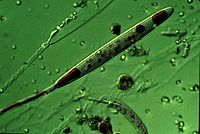
Delayed Allergic Reactions to Jellyfish Stings: Usefulness of Ultrasonographic Evaluation
Sign Up to like & getrecommendations! Published in 2018 at "Journal of Ultrasound in Medicine"
DOI: 10.1002/jum.14604
Abstract: Jellyfish stings often cause immediate local skin reactions, and, less frequently, the affected individuals may develop delayed allergic reactions days or months after the sting. Here, we present 4 such cases. In all cases, color… read more here.
Keywords: allergic reactions; jellyfish stings; usefulness ultrasonographic; stings usefulness ... See more keywords

Aquatic Antagonists: Jellyfish Stings.
Sign Up to like & getrecommendations! Published in 2022 at "Cutis"
DOI: 10.12788/cutis.0433
Abstract: Jellies, more commonly known as jellyfish, are a common cause of stings in oceans throughout the world. Most stings result in immediate painful skin reactions that can be treated with hot water immersion and careful… read more here.
Keywords: aquatic antagonists; antagonists jellyfish; jellyfish stings;

Raising Awareness on the Clinical and Forensic Aspects of Jellyfish Stings: A Worldwide Increasing Threat
Sign Up to like & getrecommendations! Published in 2022 at "International Journal of Environmental Research and Public Health"
DOI: 10.3390/ijerph19148430
Abstract: Jellyfish are ubiquitous animals registering a high and increasing number of contacts with humans in coastal areas. These encounters result in a multitude of symptoms, ranging from mild erythema to death. This work aims to… read more here.
Keywords: awareness clinical; jellyfish stings; clinical forensic; forensic aspects ... See more keywords

Inhibition of Nematocyst Discharge from Pelagia noctiluca (Cnidaria: Scyphozoa)—Prevention Measures against Jellyfish Stings
Sign Up to like & getrecommendations! Published in 2022 at "Marine Drugs"
DOI: 10.3390/md20090571
Abstract: Pelagia noctiluca stings are common in Mediterranean coastal areas and, although the venom is non-lethal, they are painful. Due to its high toxicity and abundance, P. noctiluca is considered a target species for the focus… read more here.
Keywords: nematocyst discharge; jellyfish stings; discharge; butylene glycol ... See more keywords